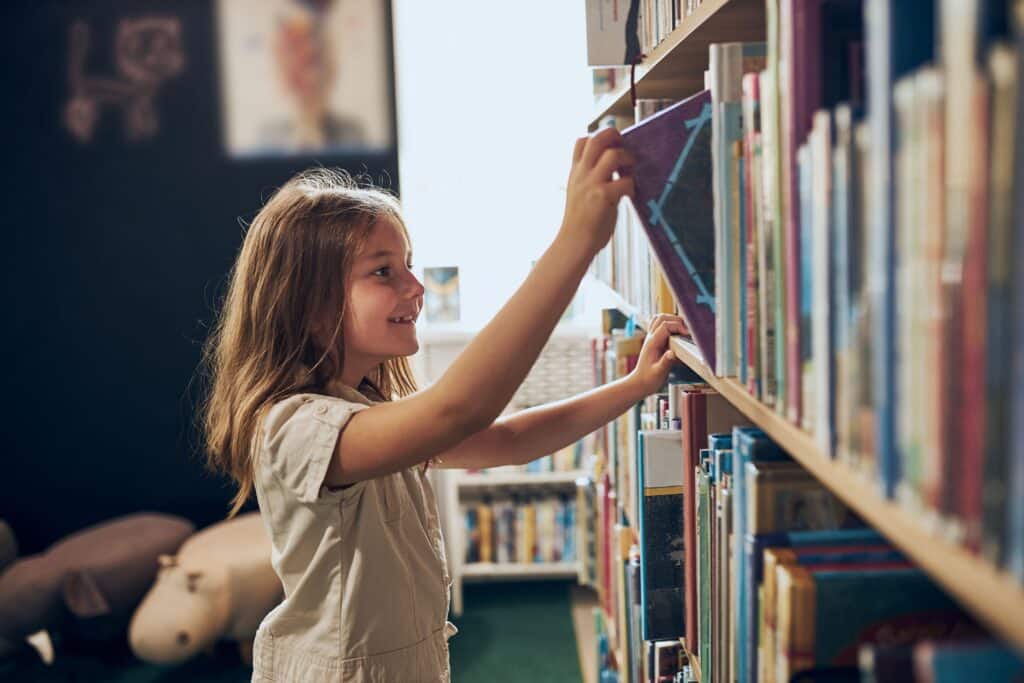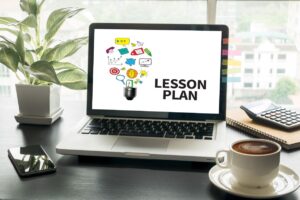Beyond Bookshelves
Modern school libraries nationwide are more than just places to borrow books. They are print-rich environments that promote a love of literacy, get students of all ages excited about reading, and create a knowledge space to spark the curiosity of every reader. In addition to keeping shelves filled with high-interest level books, school libraries have advanced technology to support students in reading, writing, and research. In many elementary school libraries, maker space corners are also a part of library visits.
Makerspace is a collaborative place for students to increase creativity, critical thinking, and communication skills. Some areas use Legos and art supplies while others use robotics and modern technology. Sadly, many school districts nationwide are fighting to keep their libraries and libraries. Now more than ever, this literary sanctuary is essential to help this “anxious generation” read, relax, and explore in a developmentally appropriate, culturally relevant location in school.
Fostering a Love of Reading
Elementary school librarians set the stage for getting our youngest students excited about reading. They provide weekly read-aloud experiences for children to be exposed to new, engaging, entertaining, and educational books. They are constantly stocking their shelves with the most recent and popular titles based on reviews and recommendations from library publications. Librarians are often responsible for providing a child with the best books for them to read and enjoy.
Think of your school librarian as a book matchmaker. They match a different book for every reader based on their likes, dislikes, interests, and reading behaviors. School libraries have bookshelves stocked with book and magazine titles of every genre and topic. School libraries also have online books and digital resources to support literacy instruction. Librarians host school book fairs that allow families to build and enhance their home libraries.
They also plan author visits to help students learn more about the writing process and meet their literary heroes in person. Authors are considered celebrities for young children, and librarians have access to literacy and library associations and organizations to make this happen. Librarians and reading specialists plan family literacy nights to help increase family engagement and community reading events. Lastly, school libraries often organize a summer reading program with public libraries to support students reading at home while schools are closed.
Safe and Inclusive Space
Student choice is powerful when it comes to fostering a love of reading. School libraries keep relevant, popular, and new titles on shelves to represent the race, religion, culture, and backgrounds of all of their students within their school community. Secondary school libraries also include books to recognize sexual orientation. Students should feel comfortable selecting and reading books that speak to them in the safe and inclusive space that school libraries can provide. When districts implement book banning, they are taking away student choice.
They are removing the many new titles, graphic novels, articles, and publications that children desire. Students feel safe reading and writing more when their voices are heard and their views are represented. Some elementary school libraries organize the Young Author’s Program to help students publish their own original books. When the school libraries display the student writing and creative books around the shelves, they show the importance of each child’s words and creative ideas. Children feel safe and secure When they are celebrated for being their authentic selves.
Librarians as Literacy Instructors
Librarians are an asset to every teacher in every school even when it comes to planning and instruction. Librarians can select titles that match any subject, topic, learning objective, or state standard the classroom teacher wants to borrow to share with her students. When teachers collaborate with librarians, lesson planning becomes easier and more efficient for instructors, and learning becomes literacy-focused for students.
Reading is the one subject needed for someone to be competent in every other subject. Librarians can also teach their own lessons during their library or designated time of day. Common topics librarians are often requested to teach because of their expertise include reference materials, digital or media literacy, plagiarism, genres, and author’s purpose.
Research is another standard of learning that is perfect to learn in the school library with assistance from the librarian. There is instant access to biographies, nonfiction books, encyclopedias, or periodicals needed to support research. Online research platforms such as Pebble Go or Google Scholar are also available in the library. Librarians, sometimes referred to as media specialists, have updated technology for students to use and teachers to check out as well.
They also can teach students and teachers about a variety of platforms and applications used to enhance reading, writing, and research experiences in the classroom. School libraries matter now more than ever, and school librarians are essential in making that happen.
Educators never stop learning; check out our available graduate degree programs to hone your skills and promote lifelong learning and academic excellence.




